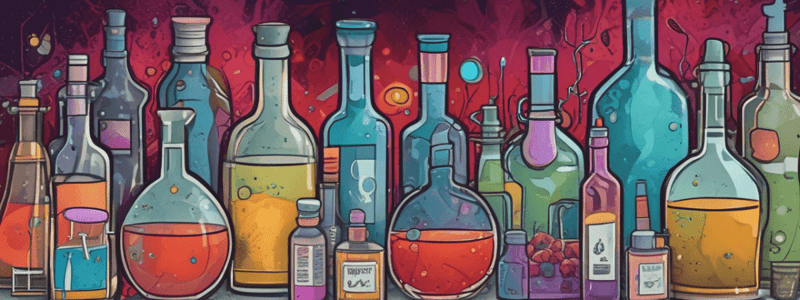Podcast
Questions and Answers
What does a toxidrome refer to?
What does a toxidrome refer to?
- The symptoms of a poisonous agent (correct)
- A treatment for poisoning
- A poisonous substance
- A type of drug addiction
Which of the following is an example of a major toxidrome?
Which of the following is an example of a major toxidrome?
- Nicotine
- Penicillin
- Aspirin
- Opiates (correct)
What is the definition of substance abuse?
What is the definition of substance abuse?
- The use of drugs only for cultural purposes
- The use of drugs only for recreational purposes
- The use of licit or illicit substances in a manner not in accordance with approved medical or social practice (correct)
- The use of drugs only for medical purposes
What is the difference between habituation and physical dependence?
What is the difference between habituation and physical dependence?
What is tolerance in the context of drug use?
What is tolerance in the context of drug use?
What is a withdrawal syndrome?
What is a withdrawal syndrome?
What is a characteristic of an antagonist?
What is a characteristic of an antagonist?
What is the primary goal of the primary survey?
What is the primary goal of the primary survey?
What is the purpose of decontamination in a toxicologic emergency?
What is the purpose of decontamination in a toxicologic emergency?
What is the significance of the SAMPLE history in a toxicologic emergency?
What is the significance of the SAMPLE history in a toxicologic emergency?
What is a contraindication for the use of activated charcoal?
What is a contraindication for the use of activated charcoal?
What is the ultimate treatment goal in a toxicologic emergency?
What is the ultimate treatment goal in a toxicologic emergency?
Flashcards are hidden until you start studying
Study Notes
• Toxidrome refers to the symptoms of a poisonous agent, which can be similar to those caused by different substances, but understanding toxidromes helps in assessing and managing different substances that fall under the same chemical-clinical umbrella.
• Major toxidromes are produced by stimulants, opiates, sedatives, and hypnotics, among others.
• Substance abuse is the self-administration of licit or illicit substances in a manner not in accordance with approved medical or social practice, and its definition may vary across cultures.
• Drug abuse is any use of drugs that causes physical, psychological, economic, legal, or social harm to the user or others affected by the drug user's behavior.
• Habituation is a psychological dependence on a drug, which may include physiological tolerance.
• Physical dependence is a physiologic state of adaptation to a drug, characterized by tolerance to the drug's effects and a withdrawal syndrome if the drug is stopped abruptly.
• Psychological dependence is an emotional state of craving a drug to maintain a feeling of well-being.
• Tolerance is a physiologic adaptation to the effects of a drug, requiring increasingly larger doses to achieve the same effect.
• Withdrawal syndrome is a predictable set of signs and symptoms, usually involving altered CNS activity, that occurs after the abrupt cessation of a drug or after rapidly decreasing the usual dosage.
• Drug addiction is a chronic disorder characterized by the compulsive use of a substance, resulting in physical, psychological, or social harm to the user, despite the harm.
• An antagonist is a drug that counteracts the action of another drug, having an affinity for a cell receptor and preventing the cell from responding.
• In any toxicologic emergency, it is essential to determine if the scene is safe, perform a primary assessment, and look for clues such as medication bottles, syringes, and other drug paraphernalia.
• The primary survey should begin with a general impression, but should not be fooled by a responsive, alert, and oriented patient, as they may still be in a life-threatening condition.
• The primary survey should identify any life threats through the ABCs (airway, breathing, and circulation), ensuring the patient has an open airway and adequate ventilation.
• The patient's circulation status should be assessed, and bleeding should be checked for; alterations in the ABCs or poor general impressions are indicators for immediate transport.
• Decontamination of the patient may be necessary before transport, depending on the poison the patient was exposed to.
• The chief complaint should be elaborated using OPQRST (onset, palliation, quality, region, severity, and timing) and SAMPLE (signs, allergies, medications, past medical history, last oral intake, and events leading up to the incident) histories.
• For unresponsive patients, the history should be obtained from other sources such as friends, family members, or medical identification jewelry.
• The sample history is important to ask about the agent, time frame, amount taken, and any interventions performed.
• If Narcan (naloxone) has been administered, the patient is at a higher risk for re-overdosing.
• If the patient has overdosed on a prescription drug, the pill bottle and remaining pills should be taken to the emergency department.
• If the substance was a commercial product, the container and remaining contents should be taken to the emergency room.
• The focus of the physical exam should be on the area of the body involved with the poisoning or the route of exposure.
• Life threats should be managed during the primary survey, and the ultimate treatment goal is to support the ABCs.
• Treatment depends on the substance, route of exposure, and signs and symptoms.
• Activated charcoal may be used for ingested poisons, but it is not indicated for patients who have ingested acids, alkalis, or petroleum products, have a decreased level of consciousness, or are unable to swallow.
Studying That Suits You
Use AI to generate personalized quizzes and flashcards to suit your learning preferences.



